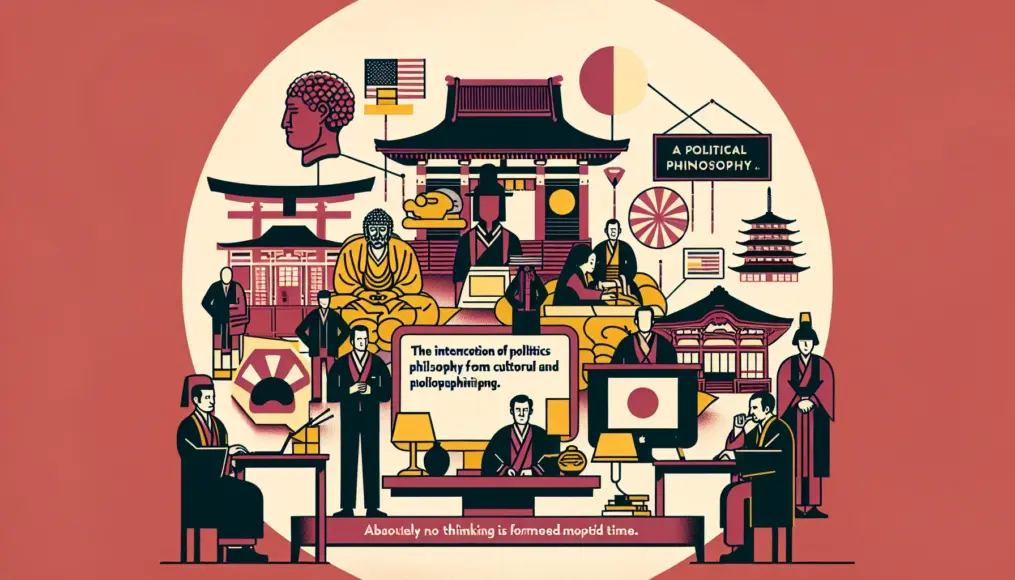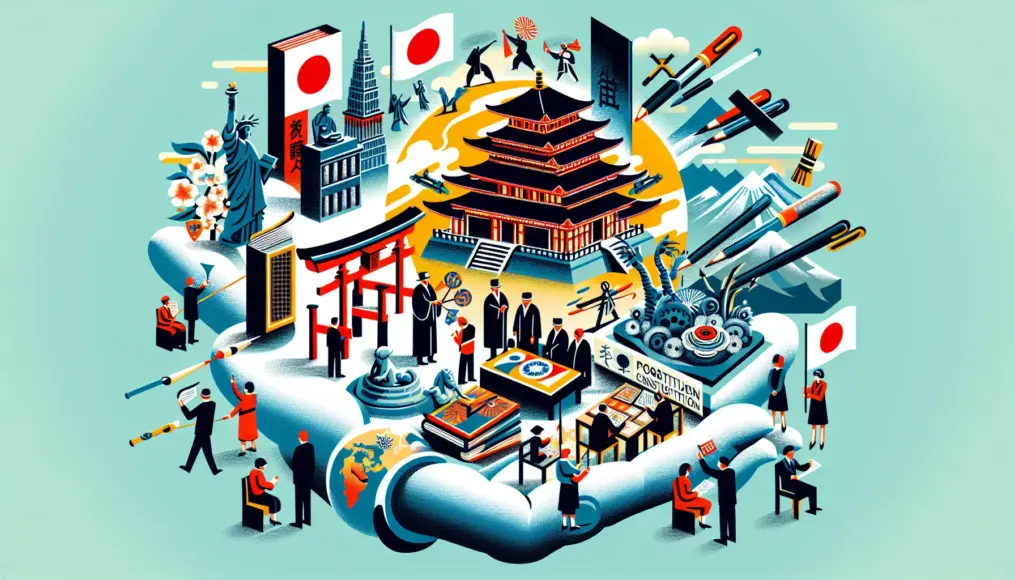At first glance, politics and philosophy might seem like two entirely different realms, but they are, in fact, deeply interconnected. By exploring the intersection of these two fields, we can gain insights into how our society and culture evolve. A look back through history reveals that political philosophy has consistently influenced people’s thoughts and actions from ancient times to the present day.
Moreover, we cannot overlook the impact of culture on politics. By examining how cultural values and beliefs are reflected in policies and electoral behavior, we can deepen our understanding of society. This blog will delve into the shared space of politics and philosophy while offering fresh perspectives on the future of political landscapes.
- A deep dive into the historical background of political philosophy
- An exploration of the cultural influences on politics
- The role of philosophy in contemporary society and its future potential
The Historical Background of Politics and Philosophy
Politics and philosophy have been intertwined since ancient times, forming a relationship that has significantly influenced human society. Political philosophy offers frameworks for understanding governance and the nature of power, making it an essential field that affects our daily lives. In this chapter, we will explore the evolution of political philosophy from antiquity to the Middle Ages and examine how these ideas continue to shape modern politics.
By looking back at history, we can better understand how we perceive and engage with politics and philosophy today. Next, we’ll delve into the characteristics of political philosophy from ancient times and its relationship with political thought during the Middle Ages.
Political Philosophy from Antiquity
The roots of political philosophy were significantly developed by thinkers like Plato and Aristotle. They pondered the nature of justice and the ideal state, exploring the essence of politics. Plato proposed the idea of an “ideal state,” envisioning a society governed by wise individuals. Conversely, Aristotle focused on ethics and justice within the context of real-world politics, deepening the connection between politics and philosophy.
These ancient ideas laid the groundwork for later political theories and institutions. Concepts like democracy and civic rights evolved from the thoughts of these early philosophers.
- The ideas of Plato and Aristotle form the foundation of political philosophy.
- The concepts of the ideal state and justice continue to resonate today.
- Ancient political philosophy has influenced democracy and civil rights.
Medieval Thought and Politics
As we moved into the Middle Ages, political philosophy began to be heavily influenced by religious thought. With the spread of Christianity, discussions about the relationship between biblical teachings and politics became more prominent. Thomas Aquinas bridged divine will and human reason, proposing a vision of moral politics. His ideas illustrated how religious values could shape political frameworks.
Additionally, during this period, the doctrine of the divine right of kings emerged, positing that a monarch’s authority was granted by God. This belief sanctified political power and influenced subsequent political theories.
If you’re interested in this topic, check out the article “What Impact Does Rousseau’s Social Contract Theory Have on Modern Society?.” It explores how Rousseau’s theories influence contemporary political systems and social structures, fostering a deeper understanding of political philosophy.
- Medieval political philosophy is shaped by religious influences.
- Thomas Aquinas’s vision of moral politics.
- The divine right of kings sanctifies political authority.
The Impact of Culture on Politics
Culture is one of the key elements that significantly influences politics. Cultural values and beliefs play a direct role in shaping policies and societal trends. In this section, we will explore how cultural changes affect policy-making and how culture reflects in electoral behavior. Understanding the relationship between culture and politics allows us to gain deeper insights into how our society is structured.
In recent years, we’ve seen culture impacting politics in new ways due to societal changes. Let’s take a closer look at the relationship between cultural shifts, policy-making, and electoral behavior.
Cultural Changes and Policy-Making
Cultural shifts can have a profound effect on political decisions. When societal values evolve, it often leads to a reassessment of policies. For instance, as concerns about environmental issues have grown, there has been an increasing demand for sustainable policies. It’s crucial to consider how these cultural trends are reflected in government actions.
Moreover, the cultural background of specific regions also influences policy. Understanding the unique characteristics of different areas and implementing appropriate policies directly contributes to effective governance. Formulating policies that take cultural changes into account is essential for building a better society.
- The impact of cultural shifts on policy formulation
- The rising concern for environmental issues and sustainable policies
- The importance of considering regional cultural characteristics in policy-making
Culture and Electoral Behavior
Culture also plays a role in electoral behavior. Understanding how specific cultural backgrounds and identities influence political choices can significantly affect election outcomes. Regional traditions and customs often impact voting behavior, influencing the strategies of politicians and parties.
Furthermore, cultural values can strengthen support for particular candidates or parties. For example, in regions where education and welfare are highly valued, candidates focusing on these areas tend to gain more support. Analyzing the influence of culture on electoral behavior is vital for a deeper understanding of democracy.
For those interested in exploring the relationship between culture and politics further, we recommend this article, “Exploring the Cultural Impact of Election Campaigns and Political Activities.” It delves into how election campaigns and political activities influence Japanese culture and examines how culture impacts politics. We encourage you to check it out!
- The influence of cultural backgrounds on electoral behavior
- The impact of regional traditions and customs on voting behavior
- Factors that strengthen support for candidates based on specific values
The Role of Philosophy in Modern Society
In today’s world, philosophy plays a crucial role in politics and policy-making. Considering policies from an ethical perspective is essential for achieving the well-being and fairness of society as a whole. This section explores the relationship between ethics and policy decisions, as well as how philosophy can contribute to the future of politics. Philosophy is not just a theoretical discipline; it also provides pathways for practical problem-solving.
To tackle the complex social issues we face today, a philosophical framework is necessary. Ethical judgments are often required, and politicians and policymakers must engage in philosophical reflection to make sound choices.
Ethics and Policy Decisions
Ethics is a central component of policy-making. In an era that emphasizes social justice and equality, it is vital for ethical standards to underpin policies. For example, welfare policies and environmental protection initiatives require approaches rooted in ethical considerations. This results in concrete measures aimed at creating a sustainable society.
Moreover, ethical judgments are crucial for enhancing the transparency and reliability of policies. When citizens can understand and accept how policies are formed and implemented, it contributes to the healthy functioning of democracy.
- The impact of ethics on policy decisions
- Ethical approaches in welfare and environmental protection policies
- Enhancing policy transparency and citizen trust
Philosophy Guiding Future Politics
Philosophy is an important element that indicates the path for future politics. Philosophical insights are expected to generate new solutions for contemporary political challenges. For instance, issues surrounding privacy and information ethics in our digital society require philosophical debate. This can lead to the proposal of policies that improve our lives.
Furthermore, future politics must respect diversity and integrate differing values. Philosophy serves as a tool for understanding various perspectives and fostering dialogue. In this way, philosophy can play a significant role in shaping the future of politics.
For those interested in this topic, I also recommend checking out this relevant article: “Environmental Pollution and Its Philosophical Considerations.” This piece delves into environmental issues from a philosophical standpoint, deepening our understanding of the challenges faced by modern society through ethical reflection.
- Philosophy providing solutions to future political challenges
- The importance of privacy and information ethics in a digital society
- Promoting dialogue that respects diversity
The Future of Politics and the Potential of Philosophy
The future of politics holds new possibilities through a deep connection with philosophy. As culture evolves, the nature of political systems and policies must also adapt. This chapter explores how cultural evolution influences politics and how philosophical perspectives can contribute to reforming future governance. Through this examination, we will seek to uncover the ideal society we aspire to build.
Philosophy not only provides a vision for future politics but also outlines concrete paths for reform. In our increasingly diverse world, philosophical dialogue is becoming ever more crucial.
The Evolution of Culture and Politics
Culture is in a constant state of flux, and its evolution significantly impacts politics. In today’s globalized society, the intersection of different cultures gives rise to new values and social structures. To respond effectively to these cultural shifts, we need a flexible and adaptive political approach.
Moreover, cultural evolution influences citizens’ awareness and fosters greater political engagement. When people understand their cultural backgrounds and actively participate in politics, they can work towards creating a better society. Thus, culture and politics are closely intertwined, continually influencing each other.
- The Impact of Cultural Evolution on Politics
- The Emergence of New Values through Globalization
- The Importance of Cultural Understanding and Political Participation
Reform from a Philosophical Perspective
Philosophy offers vital insights for political reform in the future. By delving into issues of ethics and justice, we can develop fairer and more sustainable policies. A philosophical approach can inspire new solutions to the complex social issues we face today.
Additionally, philosophy encourages respect for diverse opinions and values, fostering dialogue. This dialogue can help bridge political divides and achieve a shared understanding. The role of philosophical discourse in future politics is set to become increasingly significant.
- The Influence of Philosophy on Future Political Reform
- The Importance of Issues Related to Ethics and Justice
- Promoting Common Understanding through Dialogue
Conclusion
In this article, we explored the theme of “Politics and Philosophy,” delving into the historical context, cultural influences, the role of philosophy in contemporary society, and the potential of philosophy in shaping future political landscapes. It became clear that politics is not merely about the exercise of power; rather, it can serve as a tool for building a better society through ethical and philosophical perspectives. We also highlighted the significant impact of cultural evolution on policy-making and electoral behavior.
Philosophical dialogue and ethical considerations play crucial roles in modern politics, offering fresh insights for future political reforms. This approach not only respects diverse values but also paves the way for a more just and sustainable society.
- Politics is a tool for shaping society through ethics and philosophy.
- Cultural evolution influences policy-making and electoral behavior.
- Philosophical dialogue provides new perspectives for future political reforms.
To create a better society, it’s essential to deepen our understanding of the relationship between politics and philosophy. If you have thoughts or opinions on this article, please share them in the comments!



Comment